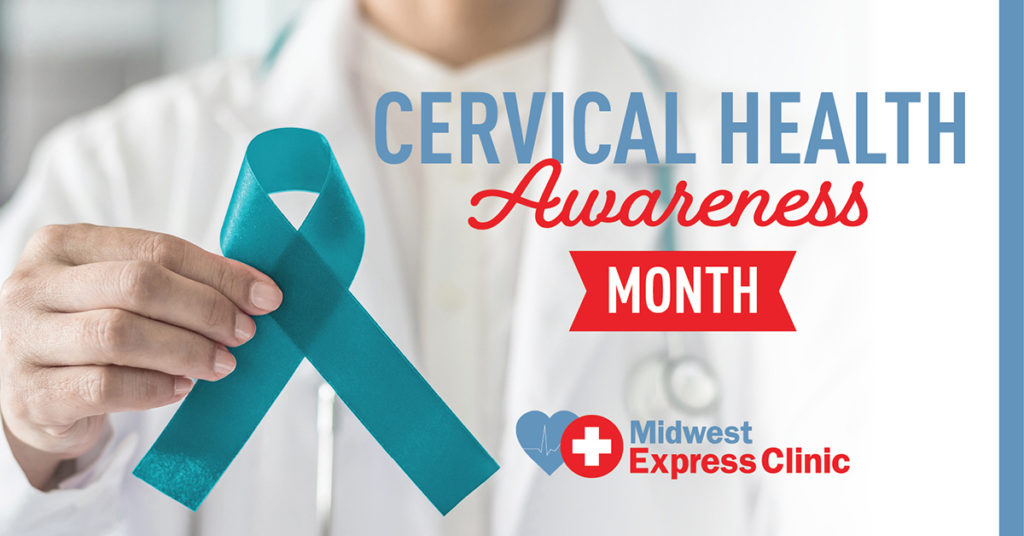Cervical Health Awareness Month: Promoting Women’s Health
 New Year’s resolutions often include a desire to better one’s personal health, perhaps through fitness or a better diet, but recommended wellness exams and health screenings should be included as a vital piece in any health journey. For women, that includes regular well-woman exams and cervical health screenings to prevent the development of cervical cancer. This January, help promote Cervical Health Awareness Month with the National Cervical Cancer Coalition (NCCC) by educating yourself and loved ones about the potential risks as well as treatment and prevention options for HPV and cervical cancer.
New Year’s resolutions often include a desire to better one’s personal health, perhaps through fitness or a better diet, but recommended wellness exams and health screenings should be included as a vital piece in any health journey. For women, that includes regular well-woman exams and cervical health screenings to prevent the development of cervical cancer. This January, help promote Cervical Health Awareness Month with the National Cervical Cancer Coalition (NCCC) by educating yourself and loved ones about the potential risks as well as treatment and prevention options for HPV and cervical cancer.
What is Cervical Cancer?
Cervical cancer is unique to women in that it begins in the cervix, which is the narrow opening between the uterus and vagina. It is considered to be one of the most preventable cancers, but is unfortunately the fourth most common to develop in women around the world. In the United States alone each year, over 13,000 women will be diagnosed and over 4,000 will die due to cervical cancer. Women age 35 to 44 are most commonly diagnosed, with rare cases occurring in those under the age of 20.
Human papillomavirus, or HPV, is the most common cause, found in roughly 99% of cervical cancer cases, although the majority of women infected with HPV will not develop cervical cancer.
The most common type of cervical cancer is squamous cell cancer, which affects the thin cells along the portion of the cervix that extends into the vagina. However, some may develop adenocarcinoma, which develops from the mucus-producing glands within the cervical canal.
Symptoms of Cervical Cancer
In early stages, symptoms most likely will not be present, so the only way to diagnose cervical cancer would be through regular Pap smears and HPV screening. As it progresses, women with cervical cancer may experience symptoms including:
- Abnormal bleeding between periods, after sex, after douching, after a pelvic exam, or after menopause
- Pelvic pain unrelated to a menstrual cycle
- Heavy or unusual discharge that may be watery or thick and may also have a foul odor
- Increase in urinary frequency
- Pain during urination
It’s important to note that these symptoms may also be a result of other health concerns and do not immediately point to cervical cancer, so it is vital to see a doctor right away for proper diagnosis.
Treating Cervical Cancer
Should you receive a cervical cancer diagnosis, the right treatment will depend on various factors, such as the stage of cancer, the size and shape of the tumor, your age and general health, and your desire to have children in the future. If found early enough, less invasive procedures like cryotherapy, laser surgery, or loop electrosurgical excision can be used to remove or destroy precancerous or cancerous cells, eliminating the need to remove the uterus or damage the cervix and preserving the woman’s ability to bear children.
Some cases, however, will require larger surgical procedures for treatment, such as a hysterectomy. A hysterectomy is the removal of the uterus with or without other organs or tissues, such as the cervix, ovaries, fallopian tubes, portions of the vagina, or surrounding ligaments, lymph nodes and more depending on areas affected. In more severe cases, a pelvic exenteration may be required to remove the lower colon, rectum, bladder, cervix, vagina, ovaries, and lymph nodes. Radiation therapy and chemotherapy are also potential options for women diagnosed with cervical cancer.
Preventing Cervical Cancer
Thankfully, there are ways you can protect against cervical cancer by catching any changes early or taking action to prevent it from developing entirely.
Because HPV is the common cause of cervical cancer, an important first step is to protect yourself against the virus up front. HPV vaccinations are available to protect against both the high risk viruses that may result in cervical cancer, as well as those that cause genital warts. For the best protection, the Centers for Disease Control and Prevention (CDC) recommends girls and boys receive the vaccine series at the age of 11 or 12 in order to get a stronger immune response for optimal protection, although it can be received through age 45.
Regular health screening can also help prevent the development of cervical cancer. When found early and treated properly, precancerous conditions are entirely curable, and cancers that have not yet spread outside the cervical area have a 5-year survival rate of 92%. Unfortunately, this survival rate declines as the cancer spreads to surrounding areas of the body. Because precancerous cells will not exhibit symptoms, a simple routine Pap test can detect any changes to the cells on the cervix. Annual testing is recommended for all women over the age of 30, although you should consult with your physician to determine how often screening should occur and which tests may be recommended.
Where to Get Routine Screening
At Midwest Express Clinic, we understand the importance of women’s health, which is why we offer comprehensive women’s health services at all of our convenient locations with office hours that work for you. If it has been a while since you have received a Pap smear or HPV test, there is no appointment necessary to visit one of our locations today. We are here to provide help for women of all ages with routine cervical health screenings, as well as other health concerns, including bladder infections, ultrasounds, and pregnancy testing.
Make 2020 the year you take charge of your cervical health, and during Cervical Health Awareness Month, encourage the women around you to do the same.




